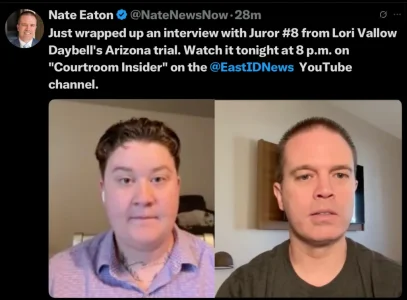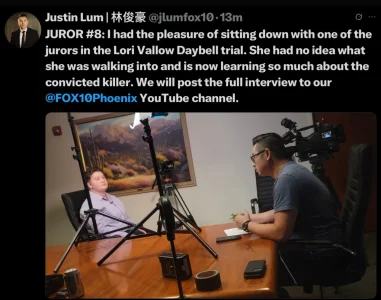I didn’t imply the jurors can make changes. I implied the judge might or could change his rules for this trial due to the fact so much evidence was left out and the case has been going for six years. I think everyone is done with this. She was declared guilt in Idaho. We knew this was coming. We know Brandon’s trial is coming. It sounds as if everyone wants a do-over when the judge hasn’t even spoken to the guy yet. A do over will change nothing.
I appreciate so much of what you write, but on the above, I think it's WAY WAY WAY off base legally - and the legality is what matters here. To be specific:
1 "the judge might or could change his rules for this trial due to ..." -- No, the judge has rules regarding evidence because THE LAW says those are the rules -- they are not arbitrary. If he allows otherwise, the cases get tossed out BY LAW when appealed and they have to be tried again, doubling the workload. The question to be determined is whether this violated the law (which it appears it did) and the proper penalty.
2 "I think everyone is done with this." -- The fact this has been a long process and onlookers or participants may be ready to have it over with has no LEGAL bearing whatsoever on where they go from here. Also keep in mind that each crime is a separate issue, with guilt or innocence for that charge to be determined separately.
3 "She was declared guilty in Idaho." -- While that's proof she did those crimes later in her life, it's completely irrelevant LEGALLY to this trial.
4 "We knew this was coming" - Our past expectations are irrelevant to the legal process.
5 "We know Brandon’s trial is coming." - Irrelevant to this case. But if this verdict is in jeopardy, or vacated, it will almost certainly impact the ability to use any of it as allowable evidence in a BB trial.
6 "It sounds as if everyone wants a do-over ..." -- I don't think ANYONE wants this verdict tossed, but the question is "What does the presumption of innocence and the need for an unbiased jury require in this situation."
7 "...the judge hasn’t even spoken to the guy yet." -- 100% true. It's certainly VERY necessary for the court to investigate what occurred, and we should expect that to follow at some point before any decision might be made. As far as I can tell, no one is suggesting any rush to judgment on the issue. Investigate, see what's true, then go from there - but also gotta recognize that where it takes us may not be what we would prefer.
8 "A do over will change nothing." -- While that's likely true, the law tries to avoid making guesses and assumptions, and instead demands proper process and proof. How they deal with this impacts how they administer justice elsewhere as well ('we just figured we didn't need to do a trial because we all know how it will go' is not gonna fly legally).


